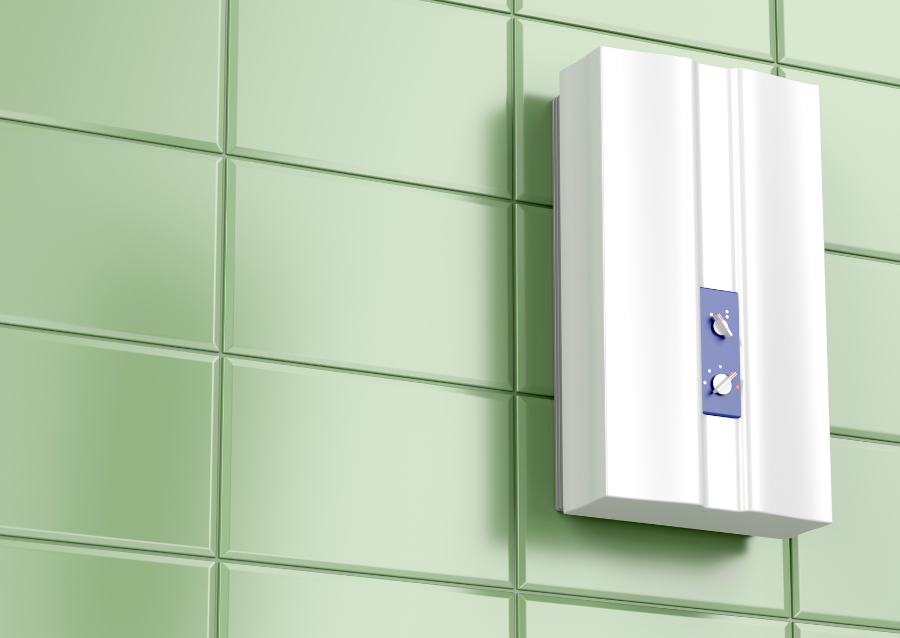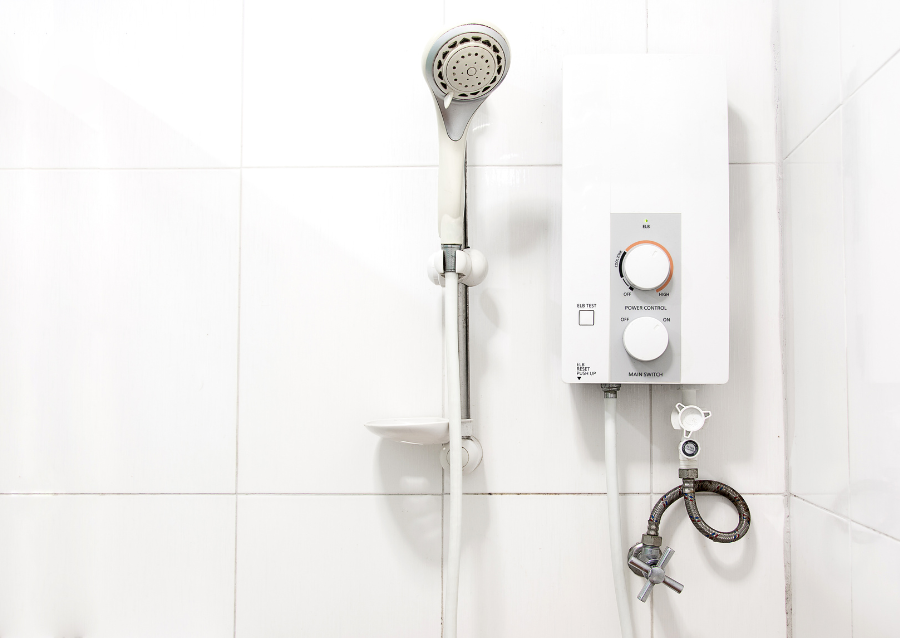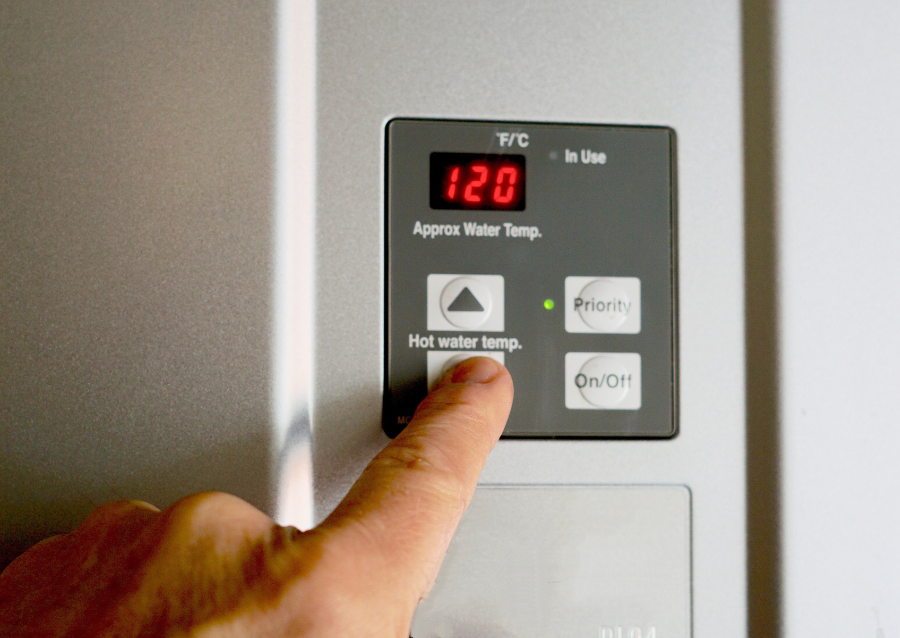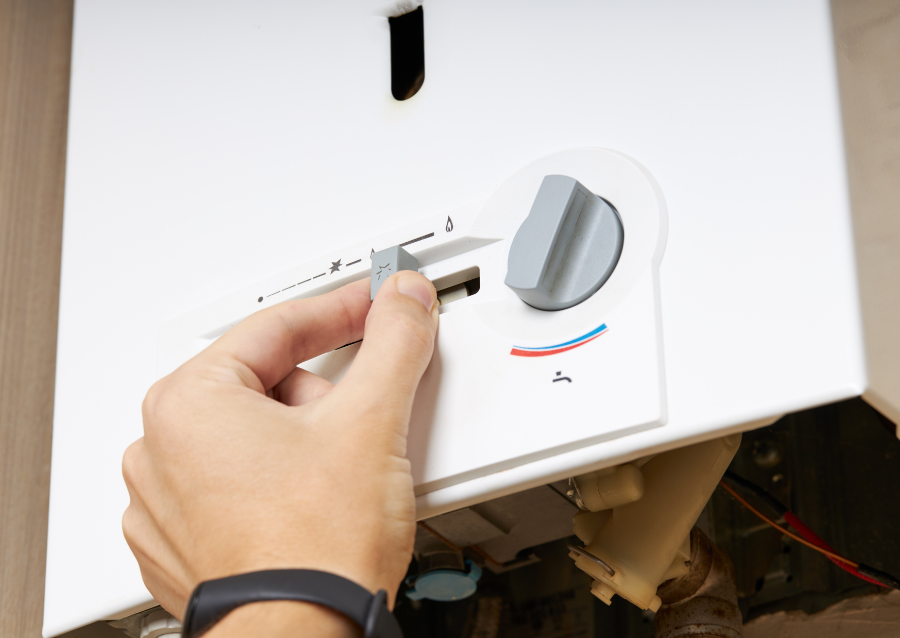
How does a tankless water heater work? Is it any better than traditional water heaters?
Most households have a traditional water heating system consisting of 40 to 50-gallon insulated storage tanks that use energy all year round, 24/7, to ensure hot water whenever needed. That’s absurdly wasteful, and with energy and gas prices skyrocketing, people are looking for efficient water heating systems to save on utility costs.
Tankless water heaters, also known as demand-type or instantaneous water heaters, are becoming more common in new homes as they can produce hot water on demand due to their tankless heater system. Keep reading to learn more.
What Is a Tankless Water Heater?
Unlike traditional water heaters that work all day long, keeping water hot in an insulated tank, tankless water heaters work very differently. Instead of storing water in a large tank, a tankless water heater works only when you turn the knob on your hot water tap.
How Does a Tankless Water Heater Work?

It’s interesting how a tankless water heater works instantly without using a storage tank. Depending on the type of tankless water heater, it could have a gas burner or electrical resistance heating coils.
When you turn the faucet on, cold water flows inside the tankless water heater and through the aluminum heat exchanger, where it instantly heats up. The hot water exits the water heater immediately and flows through the hot water tap.
Due to its innovative tankless heater system design, you have a constant hot water flow without waiting for a storage tank to fill up.
[Read: How Much Does a Tankless Water Heater Installation Cost?]
Pros and Cons of Using a Tankless Water Heater
Although tankless water heaters are great for homes due to their advantages over traditional water heating systems, it is important to know their limitations before purchasing one.
Pros of Using a Tankless Water Heater
Constant Hot Water Supply
One of the biggest advantages over a storage water heater is that tankless water heaters deliver a constant flow of hot water supply, even during the winter season.
Tankless water heaters provide two to five gallons of hot water per minute. Some gas-powered tankless water heater variants can produce higher hot water flow rates than electric tankless water heaters.
[Read: What Size of Water Heater Do I Need for My Home?]

Energy Efficient
The tankless water heater is much more energy efficient than tank water heaters since there is no water tank, and water doesn’t need to be constantly heated to the desired temperature all day.
Lower Risk of Failure
A standard water heater comes with a certain risk. Since it stores hot water in tanks, the storage unit is prone to rust, over-pressurization, and other hazards that can leak or rupture.
Although unmaintained tankless heaters also risk leakages after years of use, especially at the bottom or near joints, they do not carry the same risk of catastrophic failure as standard water heaters.
No Need for Monitoring
To prevent scalding or save energy during the summer, homeowners must change the temperature settings on their tanked water heater. Before going on vacation, homeowners may turn the water heater down or switch it off.
With tankless heaters, you don’t have to monitor them constantly, and they automatically switch off when on standby.
Low Maintenance
Tankless water heaters don’t require much maintenance compared to tank water heaters. Conducting routine maintenance can potentially prolong the life of your tankless water heater.
It is best to have it serviced once a year, but if you’re living in an area with hard water availability, you may want maintenance done twice a year. Hire a professional to take care of your heater’s maintenance needs.
[Read: 5 Signs That You Need A Water Heater Repair]
Extended Life Span
Tankless water heaters are less exposed to water-based corrosion than tank water heaters, and most tankless water heaters last over 20 years.
A traditional water heater will last up to 12 years, but if you’re living in an area with no soft water, it can die in as few as five years.
Cons of Using a Tankless Water Heater
The major disadvantages of a tankless water heater include the following:
High Upfront and Installation Costs
A tankless water heater costs three to four times more than a tank water heater, and you’ll also have to pay more for installation, especially if you’re replacing your existing storage water heaters.
Limited Water Flow

If you’ve got multiple people using hot water in the house simultaneously, a tankless hot water heater may be unable to keep up. You may experience a cold water shower, as a tankless water heater has a limited water flow rate.
Make sure to buy a tankless water heater that meets your home’s hot water demand or install several across the house.
[Read: How Long Does It Take To Install a Water Heater?]
Consult With an Experienced and Trusted Plumber in Prescott
Although a tankless water heater costs more than a storage water heater, it generally lasts much longer, requires less maintenance, and is more energy efficient.
Read our water heater buying guide to learn more about the other types of water heaters.
If you want a tankless water heater installed in your home, contact Stellar Plumbing at (928) 533-3446, and we’ll take care of your home’s hot water needs.
